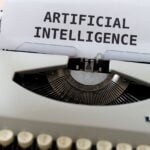
Artificial Intelligence (AI) has the potential to completely transform education, leading to a fundamental shift in how learning is approached.
In the realm of education, Artificial Intelligence (AI) emerges as a catalyst for change, reshaping conventional practices and surmounting significant challenges. AI’s influence promises enhanced inclusivity, accessibility, and efficiency across diverse learner backgrounds.
by Dailyswot.
Personalizing Learning Journeys: Tailoring Education with AI
AI introduces a transformative facet to education – personalized learning. By dissecting students’ learning styles, preferences, and strengths, AI empowers educators to forge tailored learning paths. This adaptability ensures optimal challenge and support, heightening both understanding and engagement.
Efficiency Amplified: The Role of AI Automation
AI extends its assistance beyond students to educators. By automating cumbersome academic and administrative tasks, AI liberates teachers, enabling them to focus on their core responsibilities. Automatic assignment grading expedites feedback while streamlined scheduling allocates more time to mentorship and teaching.
Smart Content Crafting: AI’s Personalized Learning Materials
AI’s prowess shines in content creation, generating bespoke learning materials. Through an analysis of students’ learning histories and preferences, AI curates content aligned with unique needs. This not only fosters profound comprehension but also nurtures independent learning.
UNESCO’s Equity Agenda: AI Integration for Inclusive Education
Recognizing AI’s potential, UNESCO aids nations in harnessing AI to fulfill the Education 2030 Agenda. Emphasizing inclusion and equity, UNESCO strives to bridge knowledge gaps and cultural diversity divides. AI’s role as a unifying force is pivotal in narrowing global technological disparities.
Equitable Education Redefined: AI’s Impact on Systems
AI’s impact surpasses efficiency and personalization; it revolutionizes education systems towards equity and inclusivity. AI’s contribution to versatile learning paths resonates with the longstanding goal of inclusive education. This shift empowers the next generation, transcending boundaries in pursuit of knowledge and opportunity.
Empowerment through AI: Enriching Educators
AI does not supplant educators; it empowers them. AI-derived insights aid teachers in refining strategies and understanding students’ progress. This symbiosis of human expertise and AI augmentation propels the teaching profession towards enhanced efficacy and influence.
Concluding Thoughts: AI’s Transformative Educational Frontier
In summation, the amalgamation of Artificial Intelligence and education promises a future marked by personalized, inclusive, and transformative learning. AI’s ability to individualize learning paths, streamline tasks, and craft tailored content reshapes education for the better. UNESCO’s dedication to equitable AI integration underscores the significance of responsible utilization. The synergy of human creativity and AI innovation will undoubtedly unlock an era of unparalleled educational progress.
Frequently Asked Questions (FAQs) about the Impact of Artificial Intelligence on Education:

As we explore the transformative potential of Artificial Intelligence (AI) in education, it’s natural to have questions about its implications and benefits. Here are some frequently asked questions to help you gain a clearer understanding:
1. What is the role of AI in education?
AI in education plays a multifaceted role. It can personalize learning experiences for students, automate administrative tasks for educators, and enhance the overall efficiency of education systems.
2. How does AI personalize learning?
AI analyzes students’ learning styles, preferences, and strengths to tailor individualized learning paths. This approach ensures that each student receives targeted content, boosting comprehension and engagement.
3. Can AI replace teachers?
No, AI is not meant to replace educators. Instead, it empowers teachers by automating routine tasks, allowing them to focus on more meaningful aspects of teaching, such as mentoring and creative lesson planning.
4. How does AI automate administrative tasks?
AI can automate tasks like grading assignments and scheduling. This frees up teachers’ time and streamlines educational processes, making the learning environment more efficient.
5. What is smart content creation in education?
Smart content creation involves AI generating customized learning materials for each student. By analyzing their learning history and preferences, AI ensures that the content aligns perfectly with individual needs.
6. How does UNESCO support AI in education?
UNESCO is committed to helping countries harness the potential of AI for educational goals while ensuring equity and inclusion. It aims to bridge knowledge gaps and cultural divides, making AI a force for unity.
7. Can AI address educational inequalities?
Yes, AI has the potential to address educational inequalities by personalizing learning for diverse student profiles. It ensures that each student has access to tailored resources and opportunities.
8. How does AI make education more equitable?
AI helps create adaptable learning paths that cater to students’ unique needs. This alignment with inclusive education principles aims to level the playing field and offer equal learning opportunities.
9. How does AI impact educators?
AI empowers educators by providing insights into student progress and suggesting effective teaching strategies. It complements their expertise, enhancing the quality of education they provide.
10. What does the future hold for AI in education?
The future of AI in education is promising. With ongoing advancements, we can expect even more personalized and effective learning experiences, bridging gaps and transforming education systems worldwide.
In conclusion, Artificial Intelligence is reshaping education by offering personalized learning, streamlining administrative tasks, and promoting inclusivity. Its potential to enhance education is vast, and as technology continues to evolve, it holds the key to a more equitable and effective educational landscape.
❤️❤️❤️ Also Read: Delving into the Realms of AI: Demystifying the Marvels of Artificial Intelligence❤️❤️❤️

